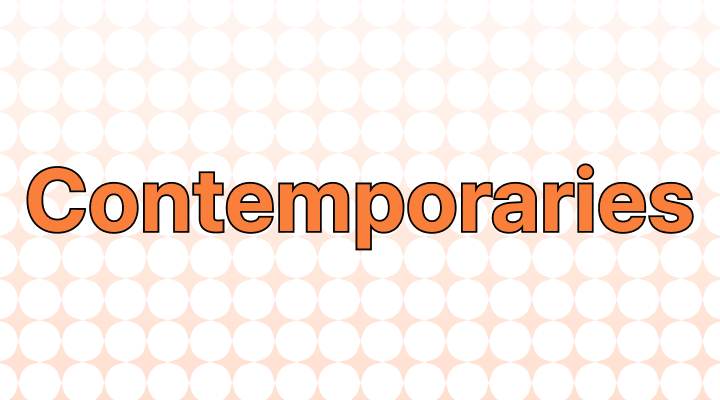The noun "contemporaries" refers to people or things that exist or occurred during the same time period, often with a suggestion of being roughly of the same age or generation. Contemporaries share a specific historical era or time frame.
This is not to be confused with the adjective "contemporary," which means of modern or recent times. Some people do use the noun "contemporaries" as the noun version of the adjective "contemporary," meaning they use "contemporaries" to describe people of the modern era. However, the official and conventional meaning of the noun "contemporaries" means people or things that exist or occur at the same time.
For example, Shakespeare and Cervantes were contemporaries; they both lived and wrote during the late 16th and early 17th centuries. The famous artists of the Renaissance, such as Leonardo da Vinci and Michelangelo, were contemporaries who produced their masterpieces during the same era. The noun "contemporaries" is not only used for famous figures. You can say that your grandfather and his contemporaries often share stories of their experiences during World War II.
In these examples, "contemporaries" refers to individuals who lived and worked during the same historical period, and it is a term commonly used in historical, literary, and cultural contexts.
Example sentences
- Charles Darwin and Alfred Russel Wallace, both naturalists, were contemporaries who independently developed the theory of evolution.
- The contemporaries of the Industrial Revolution witnessed profound changes in technology and society.
- Her ideas on gender equality were considered radical by her contemporaries, but they paved the way for progress in the women's rights movement.
- In the art world, Jackson Pollock and Willem de Kooning were contemporaries who made significant contributions to abstract expressionism.
- The contemporaries of Beethoven were amazed by his innovative compositions, which pushed the boundaries of classical music.
- The political philosophies of John Locke and Thomas Hobbes were developed by contemporaries who had contrasting views on government.
- It's fascinating to compare the works of Emily Brontë and her contemporaries in Victorian literature.
- The contemporaries of the famous explorer Marco Polo were captivated by his tales of distant lands and cultures.
- During the Renaissance, Leonardo da Vinci and Raphael were contemporaries, creating some of the most celebrated art of the era.
- In the world of science fiction, Isaac Asimov and Arthur C. Clarke were contemporaries whose writing shaped the genre's development in the mid-20th century.
Want to sound like a native speaker?
Engram’s AI-powered grammar checker makes your English sound like a native speaker’s, suggesting natural English expressions on top of fixing grammar, spelling, punctuation, word order, and vocabulary.

Reference:
















